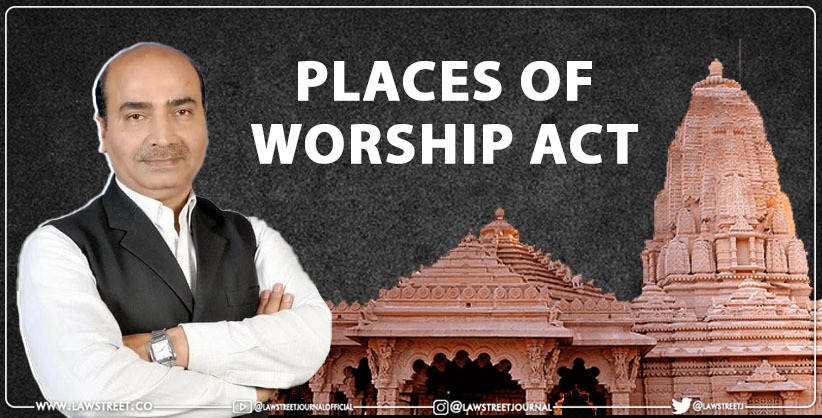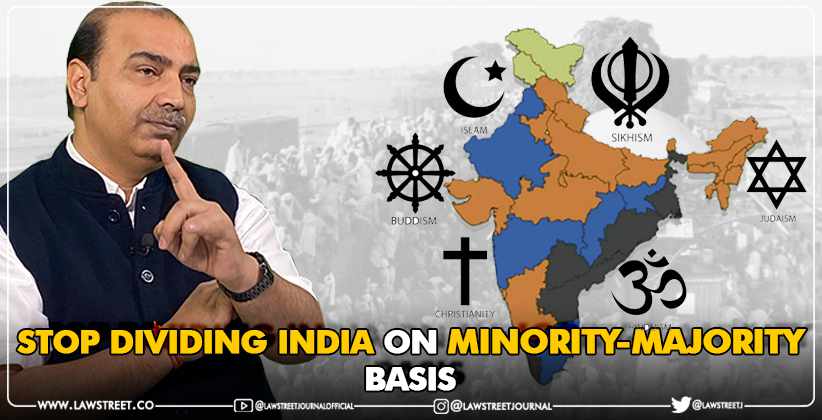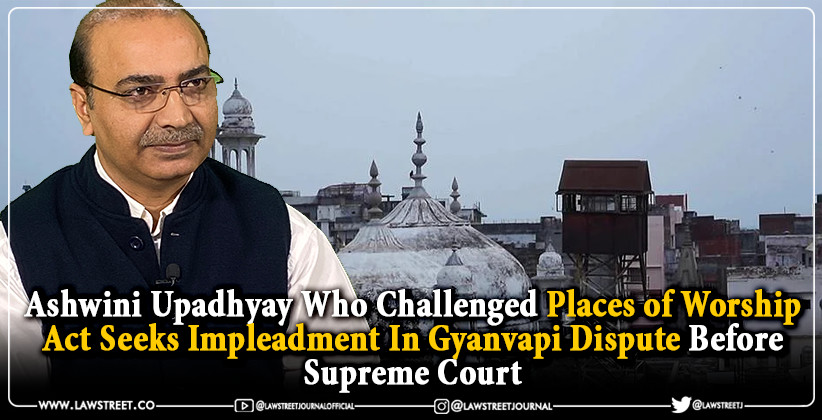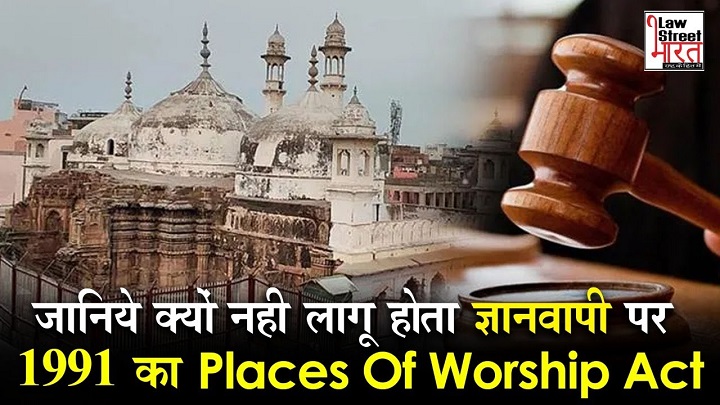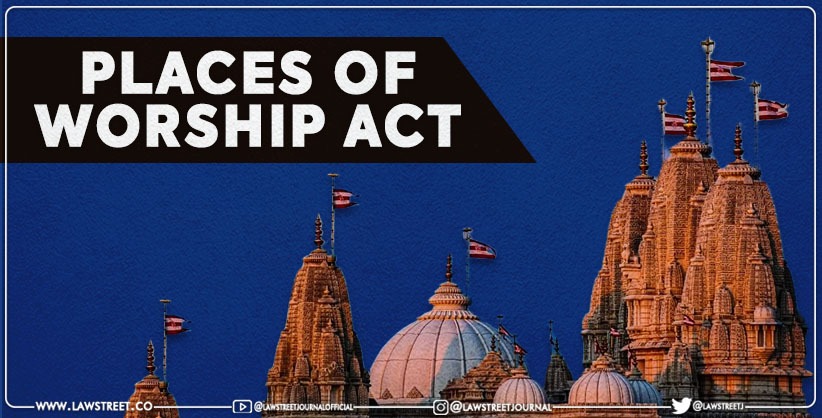NEW DELHI: BJP leader and advocate Ashwini Kumar Upadhyay, who challenged the validity of 1991 Places of Worship (Special Provisions) Act, has shot off a letter the top law officers of the country -- the Attorney General and the Solicitor General --- raising several questions of law, even as the Union government's formal response was awaited in the matter.
In his letter, he pointed out the matter has been listed for hearing before the Supreme Court on October 11. He has also sought suggestions from the top law officers of the country to pinpoint any other questions of law in the matter. Senior advocate Rakesh Dwivedi would be lead counsel on behalf of petitioner.
Earlier on September 9, Solicitor General Tushar Mehta has assured the court to file a response to the petition filed by Upadhyay and others. The court had issued notice to the Union government in the matter on March 12, 2021.
In his missive, Upadhyay said the petitioners will request the court to decide following Questions of Law:
1. Whether the parliament was legislatively competent to enact The Places of Worship (Special Provision) Act 1991 (act hereinafter) in as much as in pith and substance, the Act deals with subject matters mentioned in the State List or List-2 of 7th schedule of the Constitution, namely, Public Order (Entry-1, List-2), Pilgrimage Entry-7, List-2), Land (Entry-18, List-2), Religious Societies, (Entry-32, List-2), Offences with respect to matters in List-2, Entry-64 List-2, Jurisdiction and Powers of Court (Entry-65, List-2) which are all in the Exclusive domain of the State Legislatures?
2. Whether the Act is violative of Article 14 in as much as it discriminates in a hostile manner by restricting the operation of the Act to all States other than the State of J&k and thereby allowing the litigations relating to the places of worship to be continued and instituted in the State of J&K, while imposing a bar on the same with respect to all other States without any rational justification or nexus to the object of communal harmony and peace?
3. Whether the bar of conversion of places of worship imposed by Section-3 read with Section 2(b) is violative of Articles 14, 21, 25, 26 and 29(1) of the Constitution in as much as it assumes, contrary to settled law relating to dedication of temple and temple property to the Idol, which never dies, that seeking reclamation or restoration of the temples destroyed by Muslim invaders , specially by Aurangzeb, would amount to seeking conversion of the place of worship and thereby putting an imprimatur on the destruction of the Hindu temples and the building of structures on the temple land for offering prayers by another community? Whether this would amount to depriving the temples and the Idols of their property without any public purpose and would violate Article-300 A of the Constitution?
4. Whether the Cut-off date 15-8-1947 fixed by Section 4(1 ) of the Act is discriminatory and manifestly arbitrary and violative of Article 14, 21, 25, 26, 29(1) of the Constitution of India as for approximately 4 centuries prior to the said date the people of India were not free and subjects of initially the Mughal invaders and thereafter of British imperialists and were not in a position to seek retrieval and reconstruction and when independence was achieved by India on 15-8-47 the said date has been chosen to silence the Hindus and prevent them from retrieving and rebuilding their prime temples and to undo the deprecatory destruction of those temples.
5. Whether the second part of Section 4(2) which bars suits, appeals and other legal proceedings with respect to reclamation of place of worship is violative of Article 14, 21, 25 ,26, 29(2) in as much as it denies access to the Court of justice for peaceful resolution of disputes and redressal of wrongs committed by Muslim invaders on religious grounds by use of force? Can such an absolute bar be created without creating any alternate forum for settlement of such disputes for in its absence the Basic Feature of Rule of Law and Judicial Review would stand destroyed. [(2016) 8 SCC 509, Anita Kushwaha (Para 10-34) [(2017) UK SC 51 Unison R vs Lord Chancellor].
6. Whether Section 4 (2) of the Act is violative of Articles 14, 21, 25, 26, and 29(2) of the Constitution in as much as it mandates the abatement of pending disputes in relation to place of worships in the Courts and thereby legislatively perpetuates the destructions of prime temples and the building of structures on the temple land by use of temple materials by the Muslim invaders by use of force resulting in adversely impacting the fundamental rights of Hindus to religion and worship?
7. Whether the second part of Section-4 sub Section 2 aforementioned would envelop proceedings under Article 226 and Article 32, which is a fundamental right under the Constitution , for it is a settled law that legislatures have no power to shut out the operation of the said provisions embodying powers of judicial review. [(1997) 3 SCC 261, L Chandra Kumar; (2007) 2 SCC 1 I R Coelho]
8. Whether the proviso to Section 4( 2 ) which allows suits, appeals and legal proceedings to continue where conversion has taken place in the religious character of place of worship after 15-8-47 despite its potentiality to disturb public order, and breach communal harmony whilst shutting out litigations relating to conversions which took place in the past as a result of invaders atrocities amounts to hostile discrimination as between two classes of litigation, and this has no relation to public order and communal harmony? Whether Section-5 of the Act makes invidious discriminations by treating Ram Janam Bhumi dispute as a Class by itself while excluding from the exemption prime temples like Kashi Vishwanath (One of the 12 Jyotirlingas ) and Krishna Janm Sthan which are equally, if not more, important temples whose destruction by invaders is more soundly evidenced and recorded in history and therefore violates Artilces 14, 21, 25, 26 and 29 (1)?
9. Whether the abatement of pending suits and other legal proceedings would result in a decision of cases by legislative fiat and without following any procedure of adjudication and would be contrary to basic feature of Rule of Law and Judicial Review as held in Indira Gandhi vs Raj Narain [(1975) Supp SCC 1]?. Whether the right to worship, profess, practice and propagate religion and manage religious affairs guaranteed by Articles 25(1) and 26 of the Constitution and the right to conserve ones own culture guaranteed by Article 25 (1) would include the right to reclaim and reconstruct temples (which are a continuity) destroyed by Muslim invaders and that could be trampled upon legislatively in the name of public order and communal harmony? Whether such perpetuation and continuance of desecration would actually result in resort to violence and communal disharmony by the blocking of access to Courts for peaceful resolution?
10. Whether Suits seeking restoration and reconstruction of or for worship in the temples destroyed and demolished by the Mughal invaders would amount to conversion within the meaning of the term as defined in the Act? Whether the aforesaid issues can be said to be already decided or covered by the judgement of this Court in M. Siddiq (D) Thr Lrs vs Mahant Suresh Das & Ors, CA Nos 10866-10867 OR are they Res Integra?

